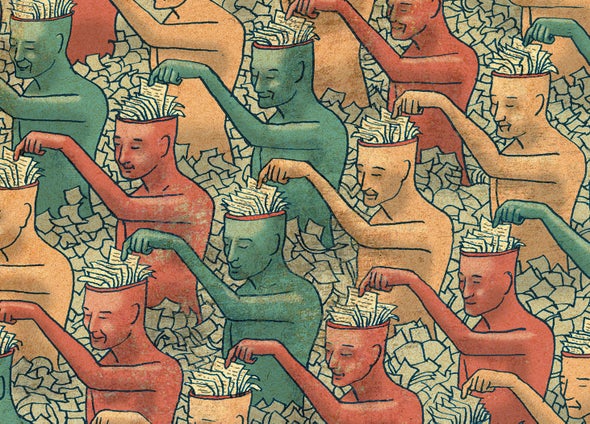Will I Ever Exist Again as Another Human
Why the "You" in an Afterlife Wouldn't Really Be You
Memories, points of view and the self

The Discovery is a 2022 Netflix flick in which Robert Redford plays a scientist who proves that the afterlife is real. "Once the body dies, some part of our consciousness leaves us and travels to a new plane," the scientist explains, evidenced by his machine that measures, as another grapheme puts information technology, "brain wavelengths on a subatomic level leaving the torso after death."
This thought is not besides far afield from a existent theory chosen breakthrough consciousness, proffered by a broad range of people, from physicist Roger Penrose to physician Deepak Chopra. Some versions hold that our mind is not strictly the product of our encephalon and that consciousness exists separately from textile substance, so the decease of your physical body is not the finish of your witting existence. Considering this is the topic of my next book, Heavens on World: The Scientific Search for the Afterlife, Immortality, and Utopia (Henry Holt, 2018), the film triggered a number of problems I have identified with all such concepts, both scientific and religious.
First, in that location is the assumption that our identity is located in our memories, which are presumed to be permanently recorded in the encephalon: if they could be copied and pasted into a estimator or duplicated and implanted into a resurrected torso or soul, we would be restored. But that is non how memory works. Retention is not like a DVR that can play back the past on a screen in your mind. Memory is a continually edited and fluid process that utterly depends on the neurons in your brain being functional. Information technology is true that when you go to sleep and wake up the next morning or go under anesthesia for surgery and come up back hours after, your memories render, as they do even subsequently and so-called profound hypothermia and circulatory arrest. Under this procedure, a patient's brain is cooled to equally low every bit 50 degrees Fahrenheit, which causes electrical activity in neurons to stop—suggesting that long-term memories are stored statically. But that cannot happen if your brain dies. That is why CPR has to be done so soon after a center attack or drowning—because if the brain is starved of oxygen-rich claret, the neurons die, forth with the memories stored therein.
2nd, there is the supposition that copying your brain's connectome—the diagram of its neural connections—uploading information technology into a computer (as some scientists advise) or resurrecting your concrete self in an afterlife (as many religions envision) will result in y'all waking up as if from a long sleep either in a lab or in heaven. But a re-create of your memories, your mind or even your soul is not you. It is a copy of yous, no unlike than a twin, and no twin looks at his or her sibling and thinks, "In that location I am." Neither duplication nor resurrection can instantiate you in some other aeroplane of beingness.
Third, your unique identity is more than than only your intact memories; information technology is also your personal indicate of view. Neuroscientist Kenneth Hayworth, a senior scientist at the Howard Hughes Medical Institute and president of the Brain Preservation Foundation, divided this entity into the MEMself and the POVself. He believes that if a complete MEMself is transferred into a computer (or, presumably, resurrected in heaven), the POVself volition awaken. I disagree. If this were done without the death of the person, there would be two memory selves, each with its ain POVself looking out at the earth through its unique eyes. At that moment, each would take a different path in life, thereby recording different memories based on different experiences. "Yous" would not suddenly have ii POVs. If y'all died, there is no known mechanism by which your POVself would exist transported from your brain into a figurer (or a resurrected body). A POV depends entirely on the continuity of self from one moment to the side by side, even if that continuity is cleaved by sleep or anesthesia. Death is a permanent interruption in continuity, and your personal POV cannot be moved from your brain into some other medium, hither or in the futurity.
If this sounds dispiriting, it is just the opposite. Awareness of our mortality is uplifting because it ways that every moment, every day and every human relationship matters. Engaging securely with the world and with other sentient beings brings meaning and purpose. We are each of us unique in the earth and in history, geographically and chronologically. Our genomes and connectomes cannot be duplicated, then we are individuals vouchsafed with awareness of our mortality and cocky-awareness of what that ways. What does it mean? Life is not some temporary staging before the big show futurity—information technology is our personal proscenium in the drama of the cosmos here and now."
This commodity was originally published with the title "Who Are Yous?" in Scientific American 317, i, 73 (July 2017)
doi:10.1038/scientificamerican0717-73
Source: https://www.scientificamerican.com/article/why-the-ldquo-you-rdquo-in-an-afterlife-wouldnt-really-be-you/
0 Response to "Will I Ever Exist Again as Another Human"
Post a Comment